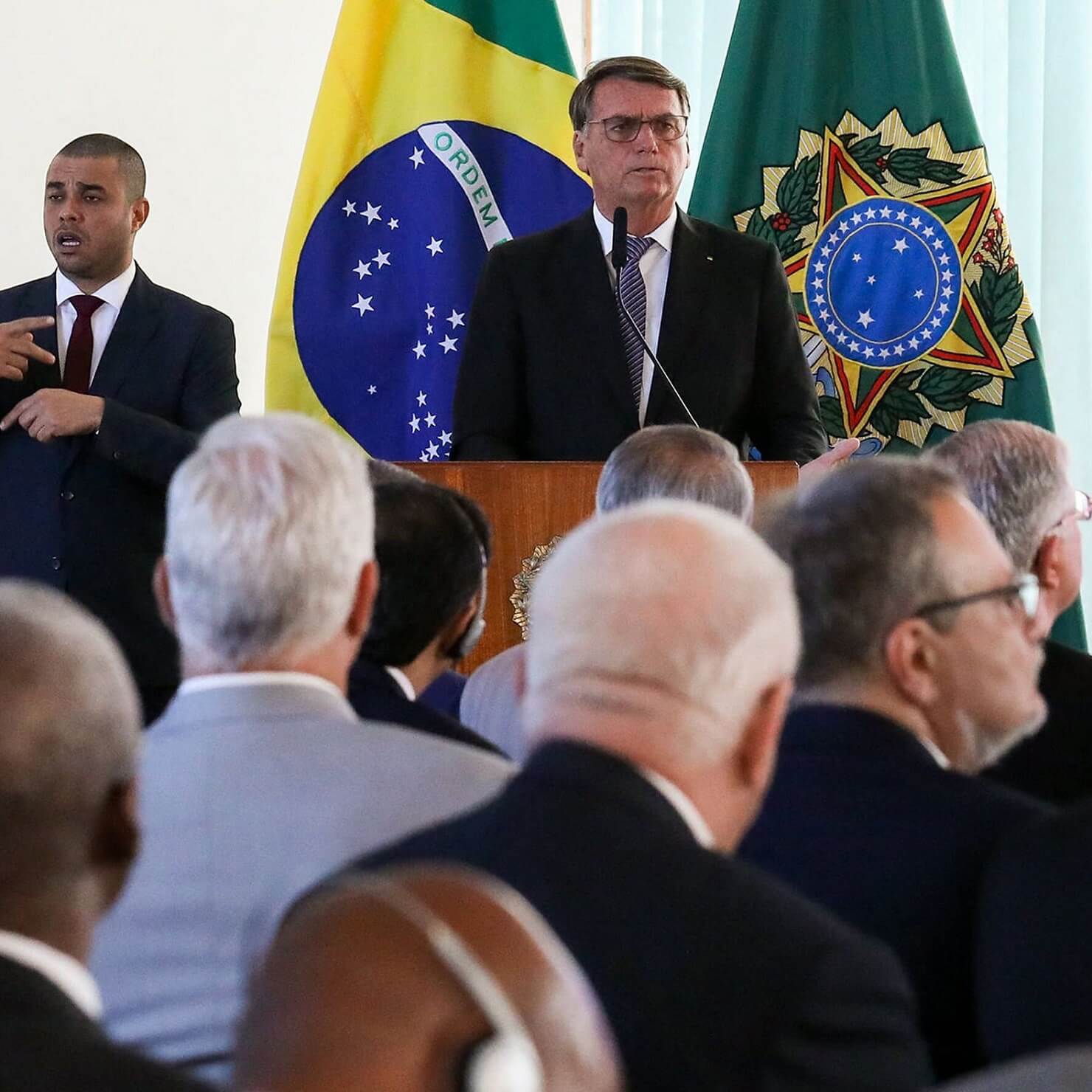In a meeting with around 70 ambassadors at the Palácio da Alvorada on Monday, Brazilian President Jair Bolsonaro once again alleged that the country’s electronic voting system is “completely vulnerable.” In an hour-long speech ahead of the presidential election in October, the Brazilian leader stressed, “An electronic system cannot give 100% guarantee of security.”
In a briefing to foreign diplomats from countries including France, Spain, the United States, Portugal, and the European Union, the incumbent president made a push for the military to oversee the conduction of the election, describing it as a “national security issue” and echoing his earlier calls for the armed forces to hold a parallel vote.
To this end, he said that “the armed forces, whose commander-in-chief is me... no one wants more stability in our country than us.” In this regard, he said that his main rival, former President Luiz Inácio Lula da Silva, and his Workers’ Party “do not want a transparent electoral system.”
Bolsonaro lambasted not only the flaws in the EVM system, but also levelled accusations against Supreme Court judges and Superior Electoral Court (TSE) officials. The far-right leader, who faces an uphill battle to be re-elected according to recent opinion polls, emphasised that “we want to correct the flaws, we want transparency, a real democracy.”
If truly concerned about Brazil's democracy, foreign diplomats being called by Bolsonaro to listen to his soliloquy of lies about Brazil's electoral process have several choices: they can boycott the meeting, walk away, or publicly voice their concerns.
— Roberto Simon (@robertosimon) July 18, 2022
To this end, he reiterated his demand for a boycott of the EVM system and instead insisted on having a “parallel vote” with paper ballots, declaring that “we cannot hold elections amid mistrust.”
Furthermore, he targeted the TSE’s former, current, and future heads—Luís Roberto Barroso, Edson Fachin, and Alexandre de Moraes— of wanting to “bring instability” by refusing to act on the “suggestions of the armed forces” and instead siding with his opposition.
Fachin responded by denouncing Bolsonaro’s “attempt to undermine the democratic system and the rule of law,” accusing him of “unacceptable electoral denialism” and of levelling “very serious allegations of fraud without any evidence.”
Likewise, Senate President Rodrigo Pacheco restated that the electronic voting system is “trustworthy.”
Presidente @jairbolsonaro é aplaudido por embaixadores após expor fragilidade e autoritarismo do TSE pic.twitter.com/kyer65NVEr
— Noticias No Face (@marco_trigueiro) July 18, 2022
Opposition leader Lula, who is being touted as the frontrunner in the upcoming presidential election, has said it was a “shame” that the president called on ambassadors not to talk about issues “in the interest of the country” but “instead tell lies about our democracy.”
Meanwhile, one of the diplomats in attendance told Reuters: “We knew what he was going to say, that was no surprise. But it is quite unusual to convene the diplomatic community to talk about a domestic issue.”
Another unnamed diplomat from a Nordic country said Bolsonaro’s speech had not changed “anything in the way we see things,” adding that there is no need to question a system that has “worked well for the last 25 years.”
Local news outlet UOL News reported that one ambassador called Bolsonaro’s PowerPoint presentation “amateurish.”
Nevertheless, while most of the European ambassadors were largely united in their criticisms of Bolsonaro, diplomats from other parts of the world, such as one from Latin America, said the Brazilian president’s concerns are “legitimate.”
Interestingly, representatives from Chile, China, Argentina, and the United Kingdom were not invited.
In this respect, Brazilian Foreign Minister Carlos França also stressed that while the Bolsonaro administration is not averse to international observers for the upcoming elections, he is “uncomfortable” with actors such as the European Union participating in the process.
Brazil's Bolsonaro summons foreign ambassadors to attack electronic voting machines - less than 3 months to the country's presidential elections. Most polls signal that he's trailing behind his left leaning rival Lula da Silva. https://t.co/0ktQa1CjbP
— brunogarcez (@brunogarcez) July 16, 2022
TSE chief Fachin, meanwhile, declined his invitation to attend Monday’s event. In fact, Fachin held a similar meeting with diplomats in May that Bolsonaro called a “rape” of democracy and an attempted coup.
Against this tense backdrop, the electoral chief warned earlier this month that Brazil could see “an episode even more severe than the January 6 (attack) on the Capitol” come the election.
Bolsonaro’s repeated bids to cast doubt on the electoral system in the country have raised speculation over his possible refusal to concede defeat. In fact, he has even outlined three possibilities for himself in the upcoming elections “being arrested, killed, or victory.”
More concerningly, he has frequently threatened to deploy the armed forces to carry out his policies and has repeatedly made public his desire to return to a more authoritarian style of governance, like that seen in Brazil’s military dictatorship from 1964-1985, when thousands of citizens were killed.

